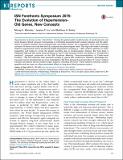Files in this item
ISN Forefronts Symposium 2015 : the evolution of hypertension – old genes, new concepts
Item metadata
| dc.contributor.author | Mansley, Morag K. | |
| dc.contributor.author | Ivy, Jessica R. | |
| dc.contributor.author | Bailey, Matthew A. | |
| dc.date.accessioned | 2021-05-24T15:30:05Z | |
| dc.date.available | 2021-05-24T15:30:05Z | |
| dc.date.issued | 2016-09 | |
| dc.identifier | 268444928 | |
| dc.identifier | a6ab2216-aba9-4a37-9cea-bff0bd484fd4 | |
| dc.identifier | 84996538058 | |
| dc.identifier.citation | Mansley , M K , Ivy , J R & Bailey , M A 2016 , ' ISN Forefronts Symposium 2015 : the evolution of hypertension – old genes, new concepts ' , Kidney International Reports , vol. 1 , no. 3 , pp. 197-203 . https://doi.org/10.1016/j.ekir.2016.08.003 | en |
| dc.identifier.issn | 2468-0249 | |
| dc.identifier.other | ORCID: /0000-0002-8082-0273/work/143917400 | |
| dc.identifier.uri | https://hdl.handle.net/10023/23243 | |
| dc.description | Funding: British Heart Foundation and Kidney Research UK. | en |
| dc.description.abstract | Hypertension is known as the “silent killer,” driving the global public health burden of cardiovascular and renal disease. Blood pressure homeostasis is intimately associated with sodium balance and the distribution of sodium between fluid compartments and within tissues. On a population level, most societies consume 10 times more salt that the 0.5 g required by physiological need. This high salt intake is strongly linked to hypertension and to the World Health Organization targeting a ∼30% relative reduction in mean population salt intake to arrest the global mortality due to cardiovascular disease. But how does a habitually high-salt diet cause blood pressure to rise? In this focused review, we discuss 2 “evolutionary medicine” concepts, presented at the ISN Forefront Meeting “Immunomodulation of Cardio-renal Function.” We first examine how ancestral variants in genes that conferred a selection advantage during early human development are now maladaptive. We then discuss the conservation of “renal” sodium transport processes across multiple organ systems, including the brain. These systems influence sodium appetite and can exert an often-overlooked effect on long-term blood pressure control. | |
| dc.format.extent | 7 | |
| dc.format.extent | 776149 | |
| dc.language.iso | eng | |
| dc.relation.ispartof | Kidney International Reports | en |
| dc.subject | Blood pressure | en |
| dc.subject | Evolution | en |
| dc.subject | Hypertension | en |
| dc.subject | Inflammation | en |
| dc.subject | Kidney | en |
| dc.subject | Pressure natriuresis | en |
| dc.subject | Salt | en |
| dc.subject | QH301 Biology | en |
| dc.subject | QH426 Genetics | en |
| dc.subject | RA0421 Public health. Hygiene. Preventive Medicine | en |
| dc.subject | Nephrology | en |
| dc.subject | Ophthalmology | en |
| dc.subject | T-NDAS | en |
| dc.subject | SDG 3 - Good Health and Well-being | en |
| dc.subject.lcc | QH301 | en |
| dc.subject.lcc | QH426 | en |
| dc.subject.lcc | RA0421 | en |
| dc.title | ISN Forefronts Symposium 2015 : the evolution of hypertension – old genes, new concepts | en |
| dc.type | Journal article | en |
| dc.contributor.institution | University of St Andrews. School of Medicine | en |
| dc.contributor.institution | University of St Andrews. Cellular Medicine Division | en |
| dc.contributor.institution | University of St Andrews. Biomedical Sciences Research Complex | en |
| dc.identifier.doi | 10.1016/j.ekir.2016.08.003 | |
| dc.description.status | Peer reviewed | en |
This item appears in the following Collection(s)
Items in the St Andrews Research Repository are protected by copyright, with all rights reserved, unless otherwise indicated.

